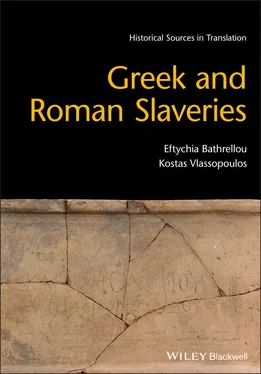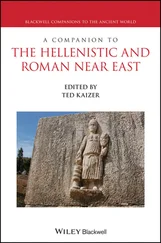Literature: Coarelli 2005; Fentress 2005; Trümper 2009: 34–49.
What entrances were there for this building? How easy was access to it? Why might this allow us to connect the agora to the slave trade?
Does the size of the courtyard suggest that the agora was a slave market? How? If not, what other functions can you imagine for this courtyard?
If the courtyard was used for housing thousands of slaves, what problems can you envisage as emerging?
How could one access the upper storey of the porticoes? In what way could they facilitate its use as a slave market? What other functions can you imagine?
Were the baths important for a large slave market? Was the size of the baths sufficient for dealing with thousands of slaves per day?
To which rooms does corridor 70a lead? Could these rooms be used for the sale of slaves?
Would slave traders require a specific large-scale building for conducting their business? What other alternatives can you imagine?
2.15 SEG III 672: Greek Graffito on Wall, Delos, Cyclades (Late Hellenistic Period) (Fig. 8)
The following graffito was inscribed in room c of the so-called House of the Lake; on the same wall, there were graffiti showing four transport ships. Antiocheia on the Maeander was a city in Karia in Asia Minor, near the river Maeander. Like most Aegean islands, Delos is relatively treeless and waterless. For Delos’ importance for the Hellenistic slave trade, see 2.14, 8.1, 8.19.
Literature: Severyns 1927; Rauh, Dillon and McClain 2008; Zarmakoupi 2016.
This is the Antiochean land: figs and plenty of water.
O Maeander Saviour, save us and give water.
What do you think did the author of this graffito want to express?
Where was it inscribed? Who was likely to use or occupy this room? Is it possible to establish this on the basis of a room plan?
Can this graffito be attributed to a slave? If yes, why? If not, what other explanations can you think of?
HEARING THE SLAVES’ VOICE?
Literature: Fitzgerald 2000; McCarthy 2000; Hunt 2011; Joshel 2011; Akrigg and Tordoff 2013; Bathrellou 2014; Richlin 2017.
2.16 Alciphron, Letters , 1.2: 31Greek Literary Epistolography (Second/Third Century CE)
This passage and the next are not real letters but fictional. Mounychia is a harbor in the Piraeus. Lemnos is an island in north-eastern Aegean, while Rhodes is an island in southeastern Aegean.
Literature: Biraud and Zucker 2018.
Galenaios to Kyrton: All our labors are in vain, Kyrton. During the day, we get scorched by the sun’s heat; in the night, we scrape off the bottom of the sea in the light of torches; and, as the saying goes, we pour our pitchers into the jar of the Danaids. So ineffectual and fruitless is the toil in which we spend our lives. We can’t fill our bellies even with sea-nettles or mussels, while our master gathers in both the fish and the coins. Nor is it enough for him to get all this out of us, but he keeps searching the boat, too. And a little while ago, when we sent this boy here, Hermon, from Mounychia to take our catch to the master, he sent orders so that we should also take to him sponges and the sea-wool that grows luxuriantly in Lemnos. The result was that, before he finished making these extra demands, Hermon left behind the fish-basket, fish and all, left us, too, boat and all, and went off on a rowing boat, having mixed with some Rhodian seamen. Thus, the master had to mourn for a slave, while we for a good fellow-worker.
The name of this letter’s writer derives from the Greek word for the stillness of the sea, while that of his addressee from the Greek word for a fish net. What do these names imply about the genre of this text?
What is the status of addressor and addressee?
What do we learn about their work?
How might Galenaios and his fellow-slaves on the boat have hoped to have fared better if they had had a different master?
How does Hermon manage to escape? What sort of links does he exploit?
Can we use this text as a realistic depiction of social relations?
2.17 Alciphron, Letters , 2.24–5: 32Greek Literary Epistolography (Second/Third Century CE)
Salakonis, the name of the female correspondent, means arrogant, and Gemellus, the name of the male correspondent, could have been understood as an allusion to a euphemism for “testicle.”
Literature: Biraud and Zucker 2018.
Gemellus to Salakonis:
Why do you act so haughtily, Salakonis you wretch? Didn’t I take you up from the workshop, where you had to work beside that lame clothes mender? Didn’t I even do it without mother’s knowledge? Aren’t I keeping you as if you were some heiress to whom I had got married? But you’ve got on your high horse, you cheap little slave girl, and you never stop giggling and making fun of me. Won’t you cease from your arrogance, you wretch? I will show you your lover is your master, and I will have you roast barley in the countryside. Then you will learn by suffering into what misery you drove yourself.
Salakonis to Gemellus:
I can endure anything, except for sleeping with you, master. In the night I did not run away, nor was I hiding under the bushes, as you thought, but I slipped into the trough and lay there, with its curve around me as cover. And since I’ve decided to end my life by hanging myself, listen to one who speaks openly and clearly; my keenness to die strips away all my fear. I detest you, Gemellus. I loathe your shaggy body and avoid it like a fox; I loathe your foul mouth, which sends forth horrible smells from the bottom of your throat. Be damned to a horrid end, so horrible as you are. Go to some bleary-eyed peasant hag, her life hanging by a … single molar, her body perfumed by … pitch oil.
What are the respective statuses of Gemellus and Salakonis?
How are they represented in this text?
How does Salakonis respond to Gemellus’ demands?
What forms of slave labor are mentioned in the text? What role does sex play among these forms of labor?
Can we use this text as a realistic depiction of social relations?
2.18 Menander, The Shield , 238–45: 33Greek Comedy (End of Fourth/Early Third Century BCE)
Daos, the slave of a young Athenian who is believed to have been killed while on military campaign in Asia Minor, returns to Athens, to his master’s house, with the booty collected by the master. In this scene, Daos, who had accompanied his master on the campaign, is in conversation with a slave waiter. Hard labor at the mills is often presented as punishment for slaves. The Getai were a Thracian tribe.
Literature: Cox 2013; Konstan 2013; Bathrellou 2014; Harrison 2019.
Waiter: Be damned to perdition then, by Zeus, since you’ve done such a thing, you idiot. You had so much gold, and slaves, and you’ve returned bringing them back for your master? And you didn’t run away? Where on earth are you from?
Daos:From Phrygia.
Waiter: A good for nothing! A sissy! Only we, Thracians, are men! Oh Apollo, the Getai are the manly sort! That’s why the mills are full of us.
What does the waiter expect Daos to have done after his master’s death on campaign? How does he explain Daos’ behavior? If this was a serious conversation and not a buffoonish scene from a comedy, how do you think Daos could have justified his decision?
What are the ethnic identities of these two slaves?
How does the waiter present his own ethnic identity? What evidence does he bring in favor of his argument?
Can we take this dialogue as a realistic representation of how slaves perceived their ethnic identities and conversed with each other? Or is this merely the mirror image of Athenian assumptions about barbarian slaves?
Читать дальше












